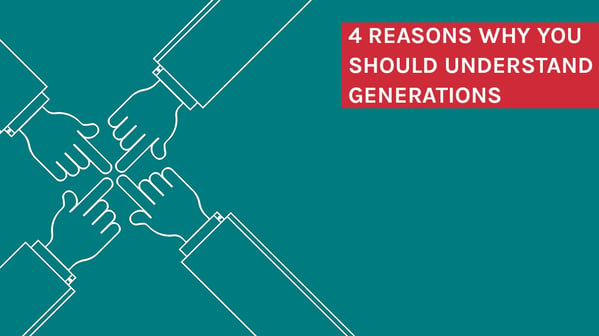Now that we’ve covered how generations are created and who the generations are, let’s discuss why generations matter.
Age cohorts, which are groups of people who are around the same age, provide a way for people to understand how different formative experiences interact with the life-cycle and aging process to shape people’s view of the world. An individual’s age is one of the most common predictors of differences in attitudes and behaviors. Age cohorts provide us insights on how various generations uniquely approach topics such as communication, leadership, technology, and work.
You can get an interesting glimpse into the future by understanding today’s generation trends. Generations serve as helpful hints (not boxes) on how best to communicate, sell, lead, and work with one another now and in the future.
Millennials being the largest generation on the planet and on the verge of entering their prime working and spending years should be enough to warrant your time and attention in order to discover how your industry or organization will be impacted. But if that is not compelling enough, here are four other reasons why you should understand generations.
1) Generational friction will increase
Since 1902, the average life expectancy of people in the U.S. has increased by 32 years. And research now informs us that the first person expected to live to see their 150th birthday has already been born. As medicine and technology continue to advance, people will be living longer and working longer.
For the first time in history, there are six living generations. As people live and work longer, you could soon be interacting across seven, eight, or nine different generations...especially since generational age spans might be shrinking. The friction that currently exists communicating, collaborating, and working across generations will only intensify moving forward.
2) A talent war is coming
Roughly 10,000 Baby Boomers will exit the workforce each day between now and the end of the next decade. As Baby Boomers begin to make their exit (a lot later than expected) from the workforce, the leadership roles that will come available in their wake will be too plentiful for the smaller-in-numbers, Generation X, to fill. Millennials will then have to leap frog into the newly vacant leadership roles, and if they aren’t prepared, they will flounder as leaders and hinder the organization. (Not to mention they will be leading many who are younger than themselves.)
Also, 68% of hiring managers agree that Millennials have skills that previous generations don’t have. The Millennial generation is the first generation in history to have skills and knowledge that previous generations don’t have. Millennials grew up teaching their parents and grandparents how to use a computer, smartphone, and Facebook. This skills gap continues to widen and cause divide across generations in the workplace.
3) Technology is rapidly transforming behaviors, values, and expectations
Because of the rapid advancements in technology, ubiquitous connectivity and the world’s information easily accessible via a mobile device, Millennials are less dependent on parents and teachers for information. Ubiquitous connectivity has allowed the emerging generation to experience and do more than what had traditionally been possible by previous generations.
Technology and the Internet have and will continue to rewire the emerging generations. Kids these days can operate a smartphone before they can tie their shoes. Studies show today’s younger generations have greater synaptic activity in their brains at any age than previous generations.
Technology is creating new behaviors, values, and expectations that have never existed before. Not only is the generation that is entering their prime working and spending years the largest generation on the planet, but they are equipped with mobile Internet enabled super computers in their pockets that have forever changed how they view and interact with the world, and their expectations surrounding career, work, and purchasing goods and services.
The emerging generations aren’t just changing…in so many ways, they ARE the change.
4) New perspectives are being forged
52% of workers say they’re least likely to get along with someone from another generation. Why the dysfunction? Because each generation has a varying experiences and perspectives that can clash in the workplace. Unaddressed generational differences in the workplace can lead to poor communication, decreased productivity, leadership miscues, decreased unity, and more.
Here are a few examples of generational differences and how perspectives shift across the four main generations in the workplace today.
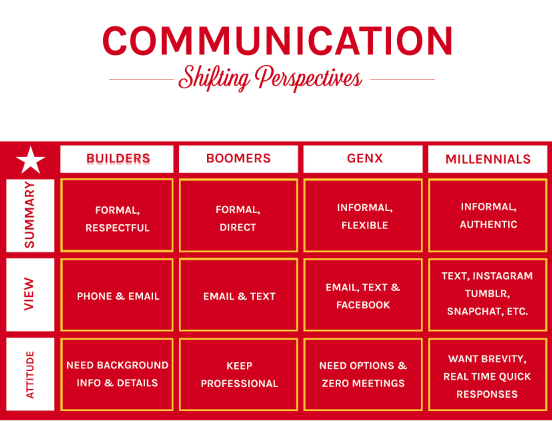
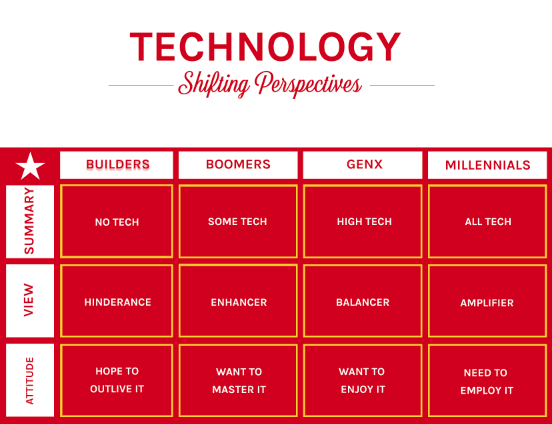
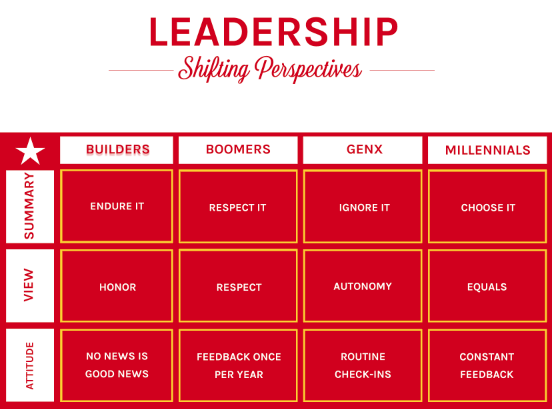
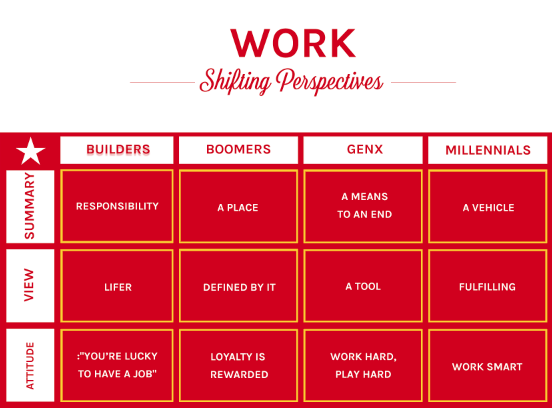
The first step in overcoming generational differences is to be aware of the differences. Then apply a generational lens to explore the many ways in which your leadership, communication, or marketing must change in order to thrive in a multi-generational workplace.

